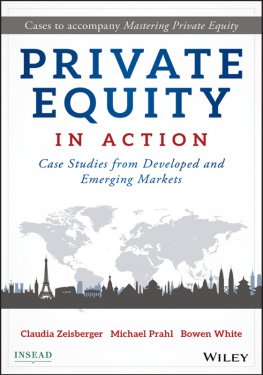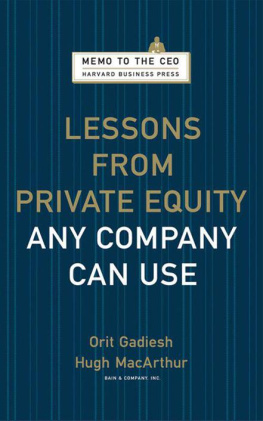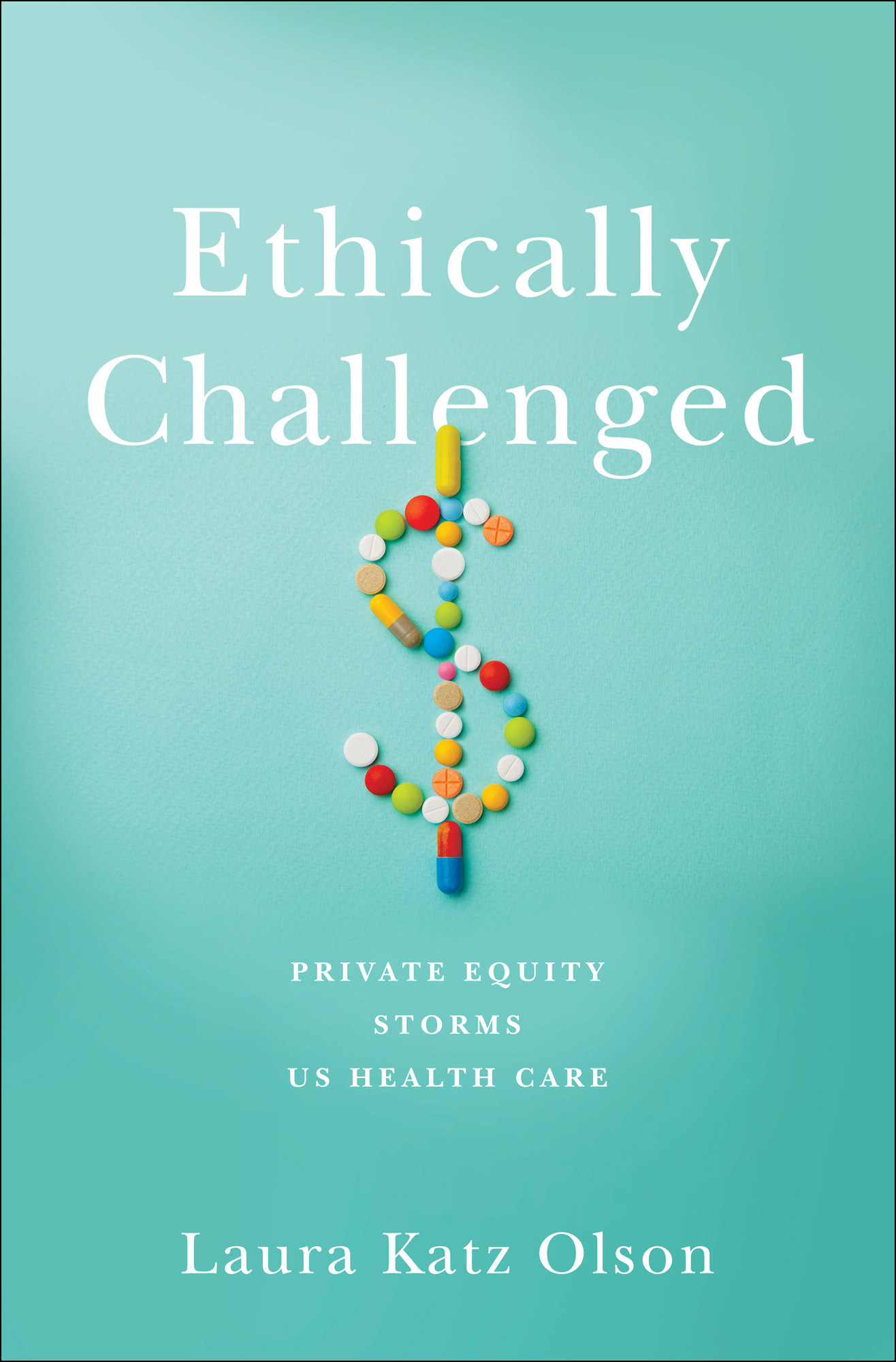Contents
Guide
ETHICALLY CHALLENGED
Ethically Challenged
+ + +
PRIVATE EQUITY STORMS US HEALTH CARE
LAURA KATZ OLSON

JOHNS HOPKINS UNIVERSITY PRESS | Baltimore
2022 Johns Hopkins University Press
All rights reserved. Published 2022
Printed in the United States of America on acid-free paper
9 8 7 6 5 4 3 2 1
Johns Hopkins University Press
2715 North Charles Street
Baltimore, Maryland 21218-4363
www.press.jhu.edu
Library of Congress Cataloging-in-Publication Data
Names: Olson, Laura Katz, 1945 author.
Title: Ethically challenged : private equity storms US health care / Laura Katz Olson.
Description: Baltimore : Johns Hopkins University Press, 2022. | Includes bibliographical references and index.
Identifiers: LCCN 2021011728 | ISBN 9781421442853 (hardcover ; alk. paper) | ISBN 9781421442860 (ebook)
Subjects: MESH: Delivery of Health Careethics | Health Care Sectorethics | Investmentsethics | Private Sectorethics | United States
Classification: LCC R724 | NLM W 84 AA1 | DDC 174.2dc23
LC record available at https://lccn.loc.gov/2021011728
A catalog record for this book is available from the British Library.
Special discounts are available for bulk purchases of this book. For more information, please contact Special Sales at .
For my daughter, Alix, and grandchildren, Zinn and Gray
ACKNOWLEDGMENTS
I owe a great professional and intellectual debt to Eileen Appelbaum, the coauthor of Private Equity at Work, who inspired me to take on the task of writing this book. Eileen has been most generous with her time and insights. She not only read the text but introduced me to a world of dedicated investigators and activists who look at private equity investments with a critical eye.
Many people shared their opinions and knowledge as I wrote, and they helped make this book a reality. I am particularly grateful to friends and colleagues who commented on various portions of the work, especially Gayle Binion, Stephen Bronner, Brian Fife, Holona Ochs, and Karen Pooley, as well as Josh Kosman, author of The Buyout of America. I owe special thanks to Deborah Stone: she painstakingly evaluated the manuscript and gave detailed comments and suggestions that contributed materially to the final product. She has been a great friend and mentor over the years.
I am indebted to the several founder-owners willing to share their postprivate equity buyout experiences with me, which added lived perceptions to my story. Experts in the various health sectors, too, imparted valuable specialized information and technical know-how. These individuals gave freely of their time.
I want to thank Lehigh University for subsidizing the private databases that rendered this research possible, two awards from the universitys faculty research grant program, another from the Department of Political Sciences Neidell Faculty Development Fund, and my distinguished professorship endowment. My heartfelt thanks to Lehighs Library and Technical Services team for instant interventions in resolving computer glitches, even those of my own making.
Others have contributed, if indirectly, to this volume. My forever friends and confidantsAnna, Betty, Bobby, Bruce, Janice, Marilyn, Phyllis, Sandy, and ViviAnnbring joy to my life and a caring space apart from work. Special cousins Carol and Sharon have offered me emotional sustenance and sisterly love. My long walks with Judy Lasker over the years have provided both camaraderie and advice of all sorts. My political science comrade John Ehrenberg has nourished me professionally and personally.
I appreciate the efforts of Johns Hopkins University Press editor Robin W. Coleman, who shepherded the book so supportively and effectively. I couldnt have written this book without the ongoing encouragement and unstinting backing of my husband, George, who read several drafts of the manuscript and endured my obsessive chatter about the private equity industry. I appreciate the ongoing moral support, sense of humor, and always perceptive ideas and observations of my daughter, Alix, an assistant professor at Emory Universitys Oxford College. It is to her and my grandchildren, Zinn and Gray, that I dedicate this book.
Of course, the opinions, conclusions, and errors are mine alone.
ETHICALLY CHALLENGED
INTRODUCTION Hiding in Plain Sight
PRIVATE EQUITY (PE) firms have put their claws into all aspects of our lives, including what we drink (Dr Pepper), where we sleep (Motel 6), how we communicate online (Skype), where we obtain office supplies (Staples), and the way we power our electronic gadgets (Duracell batteries). Now, with its voracious appetite, PE is encroaching on our health, well-being, and even our dying. If you are addicted to opioids, do not be surprised if PE owns your treatment center; if you are injured, PEs helicopter is likely swooping you up at a crash site. It can own your dermatologist, dentist, ophthalmologist, or gastroenterologist. You may be at its mercy in the hospital emergency room or at the dialysis center because your kidney has failed.
As Nicole Aschoff suggests, the PE business model is simple and brutal.it is at fire sale prices, and they exploit the enterprise again. PEs primary function is to generate value for itself by buying and selling businesses.
The Neoliberal Turn
Since the mid-1970s, the United States (like much of the industrialized world) has experienced the rise of neoliberalism, whose logic centers on privatization, deregulation, and competition intertwined in an inextricable web of perpetual capital accumulation. Neoliberals seek to hand over formerly state-run services to private players, with few restrictions. In their view, entire industries, from the production of coal to investment banking to human services, must be free from government interference. According to neoliberal reasoning, the rivalry among companies for profit will achieve greater efficiency, reduced costs, and improved quality of products or services, all without burdensome bureaucratic roadblocks. The market and its values take precedence over individual health and well-being, the environment, and glaring disparities of income. Even more, neoliberalism assumes that social well-being will improve commensurately with greater penetration of the market into the public realm.
Neoliberal views have percolated throughout every aspect of the US economy, polity, society, and culture. As David Harvey puts it, neoliberalism has become incorporated into the common-sense way many of us interpret, live in, and understand the world. For example, frail elders and prisoners have become market commodities, morality is conflated with commercial accomplishments, streamlining a business is tantamount to undercutting the workforce, and sponsorship is synonymous with ownership.
The economization of US society led to the financialization of everything, especially when capital accumulation was released from regulatory and redistributive restraints. The amassing of assets has turned into both a means for investment and a goal unto itself. Product, in other words, is secondary to money. Political institutions have become subservient to finance as well. According to these logics, the role of the state is to create underlying social and economic conditions that enable and promote investment, capital accumulation, growth, and profit making. Tax policy is used to advance the interests of entrepreneurs rather than the population at large.











